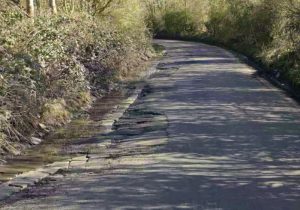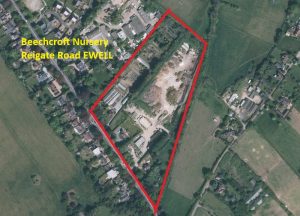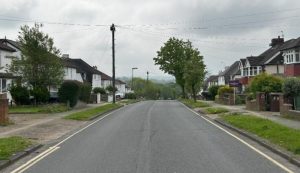A crumbling, pothole-ridden road that has been the source of countless insurance claims could be given a new lease of life. The North Leatherhead Access Road leading into the Surrey County Council recycling centre off Randalls Road has been slowly destroyed by years of heavy goods vehicles entering and leaving the site. Now, Mole Valley District Council has agreed to spend £60,000 to begin the process of repairing the heavily rutted road. The task is made more complicated as the road is co-owned by Surrey County Council and Thames Water, and it is hoped the initial work, from an overall £300,000 budget, will determine not just what needs to be done, but who pays for it.
Presenting the item to the November meeting of Mole Valley District’s cabinet was Councillor Keira Vyvyan-Robinson. She said: “Anybody who uses the recycling centre on a regular basis will be very familiar with the problems that road has. Obviously, it is heavily used by very heavy vehicles and over a period of time that heavy use has resulted in a lot of problems with the carriageway, with rutting in the verges and the channel blocks. That has resulted in increased insurance claims and also increased complaints. In February 2024, it was agreed that we would allocate just over £300,000 in order to improve that road. It is a complicated project because Mole Valley District Council owns about half of the road, the majority of the balance of it is the responsibility of Surrey County Council and Thames Water, so it’s necessary to liaise with them and reach agreements with them over the work that needs to be carried out. This budget is to start the full design and to get the proper costing, because at the moment it’s a provisional figure of about 300,000. The drawdown will enable us to finalise that, submit the planning application and reach the legal agreement with Thames Water and Surrey County Council over how much they will contribute towards the costs. For anybody who uses it, it’s quite plain that we can’t do nothing, as it’s such a detrimental situation at the moment and it will only get worse if we don’t.”
Cllr Gerry Sevenoaks, Independent member for Ashtead Park and chair of the council’s scrutiny committee, said: “As a user of that road I know it very well. It’s dangerous, especially if you are going down there and two refuse carts are coming the other way. I say ‘let’s get on with it’.”
Cllr Caroline Joseph (Liberal Democrat, Fetcham) added: “There is a huge strength of feeling locally. It’s such a small thing but it makes such a huge difference to people. If we can get this moving it will be a very positive thing to Leatherhead, Fetcham, Bookham, Ashtead, everyone locally.”
Image: North Leatherhead Access Road (image Google)





















